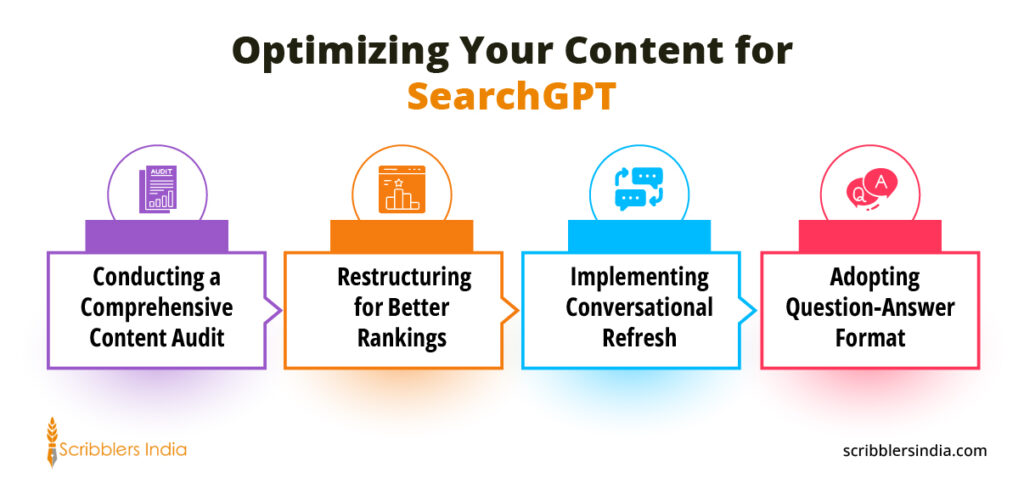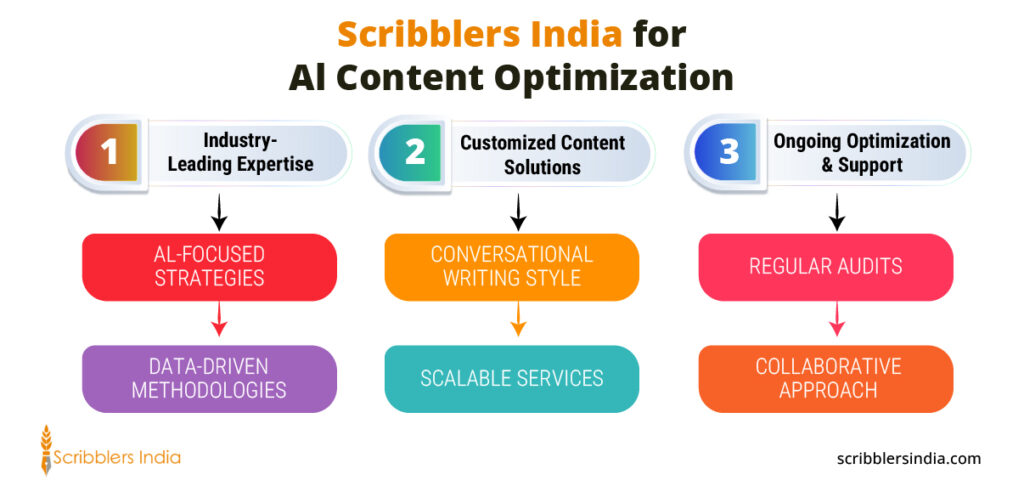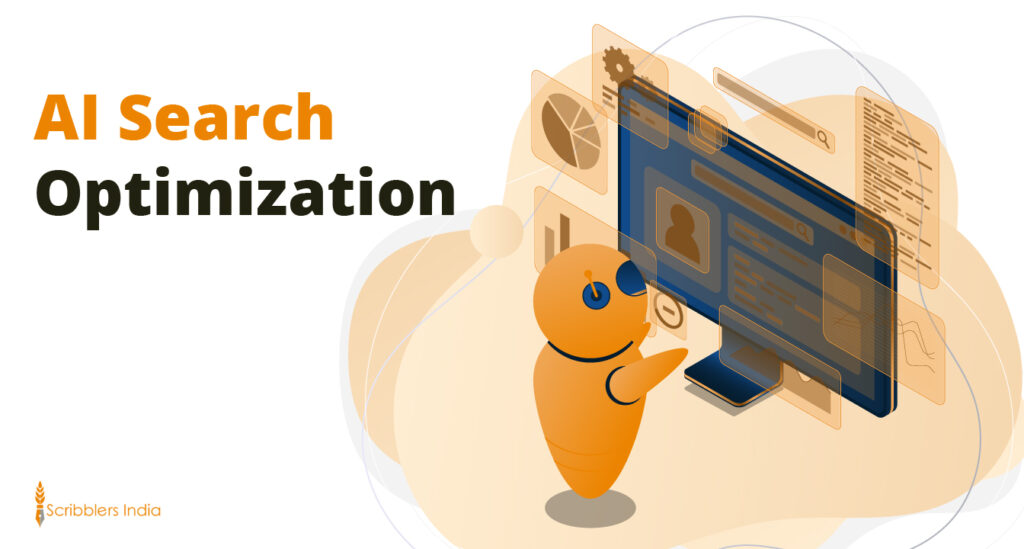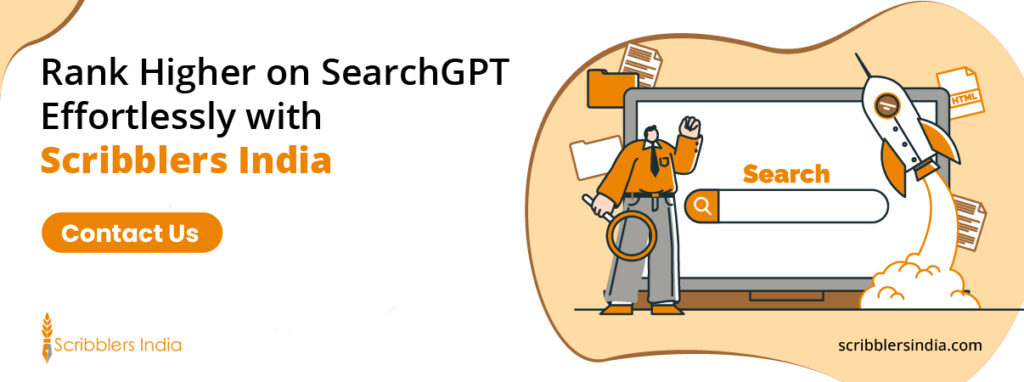Google still leads with over 130 billion monthly visits, but ChatGPT searches now exceed 3.7 billion and continue to grow. With its advanced, conversational AI technology, SearchGPT is shifting how people discover and engage with online content. This shift makes AI Search Optimization imperative for your business or personal brand.
You must tailor your SEO strategy to stand out in these AI-driven rankings. Instead of heavily ad-laden SERPs, SearchGPT strategies emphasize intent-based and contextually relevant results. This blog explores proven methods that can help your content rank better on ChatGPT, Gemini, and other AI search engines while you retain control over its authenticity and value.
What is SearchGPT’s Ranking Approach?
SearchGPT is a conversation-focused platform that retains context across multiple user queries. This innovative setup prioritizes nuanced, natural language responses over keyword-rich paragraphs.
Embracing these new ranking factors can dramatically boost your visibility, even if you are not a high-domain authority site. Let’s understand AI content ranking factors and why its methodology differs from traditional SEO approaches.
- Continuous Context: Rather than restarting with each new query, SearchGPT remembers previous questions, enabling a seamless conversation that can branch in different directions. If your content addresses these branching user needs, you will have an edge.
- Less Dependence on Backlinks: While Google places significant weight on backlinks, AI search prioritizes content reliability and source credibility derived from multiple trusted references. Quality trumps quantity, and emerging blogs or niche websites have a chance to rank if they produce thorough, well-sourced content.
- Personalized Interactions: SearchGPT fine-tunes results to the user’s query style, topic interests, and follow-up questions, providing a more individualized experience. If you are writing about a niche subject (e.g., specialized software solutions), you can rank high if your content truly satisfies that user’s informational need.
Core SearchGPT Ranking Factors
The ranking system looks at several factors that determine content visibility:
- Content Quality & Relevance: Depth, originality, and clarity form the cornerstone of ranking; the AI scours text for thorough answers and examples.
- Credibility Across Sources: The system cross-checks facts from multiple websites or databases. Presenting data from reputable sources boosts trust signals.
- Content Freshness: Regularly updated posts receive preference, mainly when they address trending topics or rapidly evolving fields such as finance, technology, or healthcare.
- User Engagement & Satisfaction: Follow-up questions, dwell time, and user satisfaction metrics (such as positive sentiment in feedback) can outweigh raw click-through rates.
Why Conversational Content Matters in AI Search Optimization?
Before Google, search results mostly relied on exact-match keywords and rudimentary ranking. Over the years, search algorithms have become increasingly advanced, but SearchGPT raises the bar entirely by interpreting user queries in a manner similar to a person in a conversation.
At its core, conversational content stands out because it reflects how humans naturally speak. If your content mimics real-life discussions, addressing the same questions and follow-ups your readers might have, you will likely see better engagement. A user who can find all relevant information in one place, without needing to jump around, often becomes a loyal follower.
Let’s explore these crucial AI SEO aspects further:
Multi-Step Reasoning & Follow-Up Queries
- Layered Answers: If a reader asks, ‘How do I optimize my blog for SearchGPT ranking factors, and how often should I update it?’ your text should address both aspects, i.e., the fundamental techniques and the recommended update frequency.
- Anticipating Follow-Ups: The user may not have considered all related questions yet. But if you pre-emptively include them, like addressing cost considerations, examples, or advanced tactics, they will remain on your page longer, signifying strong user engagement to the AI.
Natural Language Flow
- Conversational Tone: Write as though you are talking to a knowledgeable friend. Short sentences, smaller paragraphs, and rhetorical questions help mimic real speech.
- User Intent-Focused: Ask yourself: ‘What pain points does my audience have?’ Then, provide straightforward, jargon-minimized solutions.
How to Set Up Your Website for SearchGPT Success?
Technical foundations are crucial. You might have top-quality content, but if your pages load slowly or if your site architecture confuses AI crawlers, you will not rank well. The more frictionless the experience, the better your chances of landing in top results.
Beyond regular SEO tasks, such as compressing images and enabling HTTPS, there are specific steps you can take to ensure your site is ready for AI-powered search engines.
Here are some of the best practices you must follow.
- Mobile Optimization: With over 62% of all internet searches occurring on mobile devices, your site must offer a lightning-fast speed and a user-friendly interface for smaller screens.
- Structured Data & Schema Markup: FAQ Page, Article, and HowTo markup using JSON-LD helps AI search engines interpret your pages. By labeling question-answer pairs, you are more likely to appear in snippet responses.
- HTTPS & Security: Reliable encryption fosters trust with AI-driven platforms that are evaluating your authenticity.
- Server-Side Rendering (SSR): Certain AI crawlers don’t fully process client-side JavaScript. SSR ensures they see your essential data immediately.
Optimizing Site Architecture
- Logical URL Structures: Keep them crisp and descriptive (e.g., yoursite.com/searchgpt-optimization/) for both user clarity and AI comprehension.
- Comprehensive Sitemaps: Enable the OAI-SearchBot to thoroughly navigate your site. If you run a large e-commerce store with hundreds of products, well-organized sitemaps are vital.
- Clean Navigation & Internal Linking: Highlight related content from one article to another. This helps users and also ensures that AI-powered search engines see the topical connections.
Expert Tip: Invest in robust SearchGPT Content Optimization with an emphasis on Semantic SEO for SearchGPT. This ensures that you use contextually relevant terms, synonyms, and real-world language patterns, rather than repeated single keywords.
How to Use ChatGPT Search API Effectively?
OpenAI’s conversational AI models are available through the ChatGPT API, which offers unique capabilities in natural language understanding. To cite an instance, see these key features:
- Natural language processing capabilities
- Contextual response generation
- Support for conversational workflows
- Server-Side Events streaming support
The API pricing structure changes by model, starting at $0.01 per 1,000 tokens for input and $0.03 per 1,000 tokens for output. Your specific application needs and budget will determine which model works best.
How to Create Content That Ranks on SearchGPT?
With content optimization for AI, you aim to become a one-stop resource for the type of user queries that matter in your niche. This means in-depth and easy-to-read content that addresses immediate questions while leaving room for more detailed explorations.
Writing for Conversational Search Queries
- Adopt the Q&A Style: Incorporate questions throughout your content (e.g., ‘What is the best way to structure schema markup for a recipe site?’). Then, answer them meticulously.
- User-Focused Vocabulary: Think about how people ask questions in day-to-day life ‘What’s the easiest method to get started with X?’ or ‘How can I quickly fix Y issue?’ Use these forms to shape your headings and subheadings.
Natural Language Variations & Synonyms
- Semantic SEO for SearchGPT encourages a more dimensional approach. If your piece is about ‘content optimization,’ also mention ‘content improvements,’ ‘blog enhancements,’ or ‘article refinements.’
- Avoid Forced Keywords: Instead of repeating ‘SearchGPT Content Optimization’ excessively, weave it in organically alongside ‘AI-driven SEO strategies,’ ‘content authority for AI SEO,’ and other related terms.

How to Optimize Your Existing Content for SearchGPT?
If you have an established blog or resource library, a content audit can reveal hidden opportunities. Your website traffic can increase by up to 30% through regular content audits, which help maintain search engine visibility.
Minor tweaks, such as updating statistics, adding new subtopics, or incorporating more conversational phrasing, can breathe new life into pages struggling to attract traffic. AI Search prioritizes relevance and accuracy, so refreshing older material is time well spent.
Conduct a Comprehensive Content Audit
- Relevance & Quality: Examine if the article still addresses the main questions people might have about that topic.
- Technical Health: 404 errors, slow loading images, or missing titles can impede crawlers and degrade user experiences.
- Engagement Metrics: High bounce rates may indicate that readers aren’t finding what they need or that the content is outdated.
Restructure for Better Rankings
- Break Large Blocks of Text: Shift from dense paragraphs to scannable bullet points and short paragraphs.
- Update Examples & Data: Cite fresh research or user stories to show ongoing relevance.
- Enhance Readability: Use subheaders that reflect user-oriented questions: ‘How do I fix slow page speeds on mobile?’ or ‘What’s the simplest way to incorporate structured data?’
Implement Conversational Refresh
If your existing articles read like textbooks, lighten the tone. Talk directly to your reader: ‘You might be wondering why your SEO efforts haven’t paid off yet… Let’s explore how to fix that.’ This approach fosters a sense of dialogue that resonates with AI’s conversational framework.
Adopt Question-Answer Format
The question-answer format works really well for SearchGPT rankings. While keyword optimization still matters, SearchGPT prefers content that gives clear, direct answers to user questions. You should build your content around the common questions people ask in your field. Your answers need to be detailed without losing clarity.
Which are the Best Strategies for Leveraging ChatGPT Search Engine Features?
SearchGPT is essentially ChatGPT technology tailored for search. Its advanced query understanding outperforms many older systems, delving deeper into user intentions and related contexts.
When you understand these built-in capabilities—like natural language interpretation, semantic expansions, and real-time data integration—you can craft impactful content for your AI search optimization strategy.
Query Expansion & Semantic Connections
- Topic Clustering: Group related subjects under a broader theme. If you’re writing about ‘SearchGPT ranking factors,’ also touch on ‘AI algorithm priorities,’ ‘semantic queries,’ and ‘technical readiness.’
- Voice Search Compatibility: Many people now issue voice commands. Write with an ear for how they actually speak: ‘Hey SearchGPT, can you show me the best ways to optimize my blog for AI-based ranking?’ If your text reflects these patterns, you’re more likely to appear in voice search answers.
Real-Time Data Integration
- Timely Updates: If your content references shifting regulations or rapidly changing industries (crypto, AI policies, etc.), highlight current data or disclaimers.
- Personalized Results: Tailor your text to specific audiences (e.g., small businesses vs. large enterprises). A specialized angle can help the AI match your content to the right user queries.

How to Leverage Featured Snippet?
Appearing in a featured snippet remains a valuable way to drive visibility, particularly with voice-assisted queries. Crafting your content to directly and concisely answer user questions can lead to higher search engine placements.
Think of a snippet as a curated highlight of your content. It provides the user with immediate information, typically presented in bullet points, short paragraphs, or tables. If you consistently structure your articles with potential snippet pullouts, you increase your chances of getting these prime AI search spots.
- Numbered Lists: Perfect for step-by-step tutorials, checklists, or instructions.
- Bullet Summaries: Ideal for concise definitions or pros and cons.
- Brief Paragraphs: Ideal for ‘What is X?’ type queries. Keep it tight: ~40–50 words is a sweet spot for many snippet displays.
How to Keep Your Content Fresh and Future-Proof?
In a world where technology and consumer preferences evolve rapidly, ‘publish and forget’ is no longer viable. SearchGPT prioritizes up-to-date data, particularly when users request the latest information.
By consistently reviewing and updating your articles, such as adding new references, linking to recent studies, or clarifying outdated terms, you signal to both users and AI that your site remains a reliable resource. It is like having an ongoing conversation with your audience, where you provide timely facts and perspectives.
Identify Outdated Details
- Software Versions or Product Updates: If you mention outdated software, update it to the latest version.
- Statistics: Data from five years ago might cast doubt on your credibility if more recent figures exist.
- Breaking News & Regulations: If your content addresses laws or emergent technologies, revise promptly when they change.
Highlight Timely Insights
- Add ‘Subject to Change’ Notes: Inform readers about aspects that are subject to change (such as AI guidelines or privacy regulations).
- Set Revision Reminders: Keep a quarterly or biannual schedule to reevaluate and refresh critical pillars of your site.

Why Choose Scribblers India for AI Search Optimization?
Before wrapping up, let’s talk about choosing the right partner to support your AI search optimization. Scribblers India stands out as a forward-thinking content solution provider with a track record of helping brands thrive in emerging search landscapes.
At Scribblers India, our experts understand that ChatGPT Content Optimization is focused on connecting with audiences on a deeper level while aligning with ever-evolving AI technologies.
Here are a few reasons why collaborating with us might be your next best step:
Industry-Leading Expertise
- AI-Focused Strategies: Our team stays current on the latest AI and machine learning trends, so you don’t have to.
- Data-Driven Methodologies: We will analyze your site’s metrics to pinpoint areas that need improvement, whether it is technical aspects, structured data usage, or content tone.
Customized Content Solutions
- Conversational Writing Style: We craft text that resonates with readers and aligns seamlessly with AI queries.
- Scalable Services: Whether you require a handful of blog posts per month or a large-scale content campaign, we offer flexible packages.
Ongoing Optimization & Support
- Regular Audits: We don’t disappear after delivering your copy. Our experts will help you monitor performance and suggest refinements to improve your ranking.
- Collaborative Approach: We view each project as a partnership, working closely with you to ensure your brand’s voice and objectives are clearly communicated.
If you are looking to harness AI search optimization for sustained results, Scribblers India can guide you. Get in touch with our team today to learn more about of SearchGPT content optimization services.
Final Thoughts on SearchGPT
AI search has ushered in a new era that values context, comprehension, and user-centric solutions. Aligning your site with generative engine optimization practices means meeting readers exactly where they are, in the moment they need you most.
- Master the Technical Side: From responsive design to structured data, ensure your site is AI-crawl-friendly.
- Create Conversational Content: Structure your articles with Q&As, synonyms, and real-world language.
- Regularly Update & Expand: Keep an eye on fresh data, new regulations, and evolving best practices.
By integrating these strategies, you will be well-positioned to capture a growing slice of AI-driven search traffic from casual voice queries and complex multi-step inquiries. AI is the future of search, and your content can lead the way if you remain adaptable, consistent, and user-focused.
FAQs on AI Search Optimization
How does SearchGPT differ from traditional search engines?
SearchGPT tracks conversational context across queries, prioritizing content quality, user satisfaction, and source credibility, placing a heavy emphasis on these factors over backlinks. This makes it easier for smaller or newer sites with robust, relevant information to rank well.
Why is conversational content crucial for AI Search Optimization?
Conversational content reflects how people naturally speak and query information. Since SearchGPT interprets language contextually, well-structured, dialogue-oriented text can improve visibility and user engagement.
What makes featured snippets important for SearchGPT?
Featured snippets enable immediate question resolution, often surfacing your content at the top of results. They are particularly valuable for voice search, where concise and direct answers are often spoken back to users.
How can I prepare my site for AI content optimization?
Start with a technical audit: ensure fast mobile page loads, add schema markup, and serve critical content via server-side rendering. Then, create high-value, natural-language content that thoroughly answers user questions and is frequently updated with fresh data.
Why choose Scribblers India for SearchGPT Content Optimization?
Scribblers India excels at developing AI-friendly strategies. Our team stays up-to-date on the latest algorithm shifts, crafts engaging, conversational copy, and helps you maintain the quality and relevance of your content over time. By partnering with us, you gain access to both advanced SEO expertise and a commitment to authentic brand storytelling.






